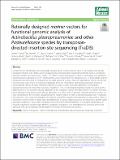Rationally designed mariner vectors for functional genomic analysis of Actinobacillus pleuropneumoniae and other Pasteurellaceae species by transposon-directed insertion-site sequencing (TraDIS)
Abstract
Comprehensive identification of conditionally essential genes requires efficient tools for generating high-density transposon libraries that, ideally, can be analysed using next-generation sequencing methods such as Transposon Directed Insertion-site Sequencing (TraDIS). The Himar1 (mariner) transposon is ideal for generating near-saturating mutant libraries, especially in AT-rich chromosomes, as the requirement for integration is a TA dinucleotide, and this transposon has been used for mutagenesis of a wide variety of bacteria. However, plasmids for mariner delivery do not necessarily work well in all bacteria. In particular, there are limited tools for functional genomic analysis of Pasteurellaceae species of major veterinary importance, such as swine and cattle pathogens, Actinobacillus pleuropneumoniae and Pasteurella multocida, respectively. Here, we developed plasmids, pTsodCPC9 and pTlacPC9 (differing only in the promoter driving expression of the transposase gene), that allow delivery of mariner into both these pathogens, but which should also be applicable to a wider range of bacteria. Using the pTlacPC9 vector, we have generated, for the first time, saturating mariner mutant libraries in both A. pleuropneumoniae and P. multocida that showed a near random distribution of insertions around the respective chromosomes as detected by TraDIS. A preliminary screen of 5000 mutants each identified 8 and 14 genes, respectively, that are required for growth under anaerobic conditions. Future high-throughput screening of the generated libraries will facilitate identification of mutants required for growth under different conditions, including in vivo, highlighting key virulence factors and pathways that can be exploited for development of novel therapeutics and vaccines.
Citation
Bossé , J T , Li , Y , Leanse , L G , Zhou , L , Chaudhuri , R R , Peters , S E , Wang , J , Maglennon , G A , Holden , M T G , Maskell , D J , Tucker , A W , Wren , B W , Rycroft , A N , Langford , P R , Tucker , A W D , Weinert , L A , Wang , J T , Luan , S-L , Beddow , J , Cuccui , J , Terra , V S & consortium , O B O T BRPT 2021 , ' Rationally designed mariner vectors for functional genomic analysis of Actinobacillus pleuropneumoniae and other Pasteurellaceae species by transposon-directed insertion-site sequencing (TraDIS) ' , Animal Diseases , vol. 1 , 29 . https://doi.org/10.1186/s44149-021-00026-4
Publication
Animal Diseases
Status
Peer reviewed
ISSN
2731-0442Type
Journal article
Description
This work was supported by a Longer and Larger (LoLa) grant from the Biotechnology and Biological Sciences Research Council (BBSRC; grant numbers BB/G020744/1, BB/G019177/1, BB/G019274/1 and BB/G018553/1), the UK Department for Environment, Food and Rural Affairs and Zoetis awarded to the Bacterial Respiratory Diseases of Pigs-1 Technology (BRaDP1T) consortium. Funding for LZ was provided by the BBSRC (grant number BB/C508193/1).Collections
Items in the St Andrews Research Repository are protected by copyright, with all rights reserved, unless otherwise indicated.

